THE LINE UP II - a short playette for a short encounter
By Eleanor Tylbor
SCENE: Supermarket. 8-items-or-less line, where three people are waiting to check out items. A female with a shopping cart attempts to go through
FEMALE
Um - excuse me?
Male in front appears not to hear her so she speaks a little louder
FEMALE
Excuse me! I'd like to pass?
Male glances at her, then quickly away
FEMALE attempts to go by but is unable, due to the man blocking her
FEMALE
The aisle is wide and I'm thin, but not enough to squeeze by. If you don't mind - could you move to the side?
the other two customers gladly move against the counter to allow the shopping cart & female to pass. Male mumbles something unintelliglble, pointing to the door
FEMALE
Look - I had to pee. Okay? I parked my shopping cart outside the door and now I have to get through here to shop. So if you'll step aside...
MALE
Go out and around!
FEMALE
Pardon? You expect me to take my cart, go outside and re-enter when all you have to do is move towards the side, which will take a mere 10 seconds? Not!
the two shoppers move against the counter, again to allow the cart to pass
FEMALE
I don't believe this!
MAN STANDING AT COUNTER NEARBY
Me neither! I've been watching the guy. Misery!
FEMALE
Are you going to let me by or not?
MAN stands defiantly in middle of checkout aisle
FEMALE stands leaning on shopping cart, glaring at man who up until this point has been taking his time packing his things in bags.
FEMALE
(as MAN moves by her)
You are just too kind and what a gentleman! I'll make sure to remember your face in case you want the same courtesy.
MAN STANDING NEARBY AT COUNTER
Oh he's a real nice guy, alright!
As MALE passes, FEMALE shopper moves her shopping cart forward and somehow rolls a wheel over his foot
FEMALE
Oh no! How clumsy of me! Just one foot, though. You still have another! And now to go shop for food...
Viewing: Blog Posts Tagged with: vonnegut, Most Recent at Top [Help]
Results 1 - 13 of 13
Blog: A. PLAYWRIGHT'S RAMBLINGS (Login to Add to MyJacketFlap)
JacketFlap tags: playette, humor, shopping, shoppers, fast food, supermarket, short sketch, Add a tag
Blog: NOTE TO MYSELF (Login to Add to MyJacketFlap)
JacketFlap tags: business, home, shopping, daily life, surveys, gift card, sale, return counter, shoppers, re-gift, daily life, sale, gift card, gift card, gift card, return counter, shoppers, re-gift, Add a tag
NOTE TO SELF: USE GIFT CARD
There used to be a time when store clerks and shoppers dreaded the day after Christmas in anticipation of the post-holiday return madness. The endless line-ups to bring back items that were the wrong size, bad color selection, vile scent or mis-guessed sizes appear to be on the wane with the growing popularity of gift cards.
Surveys according to America's Research Group, which polls shoppers for retailers, indicate that significantly fewer shoppers would be returning gifts this year. Ten years ago, the group found, 38 percent of consumers said they had an unwanted gift to return after Christmas. Five years ago, that number was 33 percent; this year, it is 14 percent.
The National Retail Federation surveyed shoppers and found that 64.3 percent didn’t return anything last holiday season, up from 62.4 percent in 2005.
When you think about it a gift card makes a lot of sense since it allows the recipient a good span of time to reflect upon what they really want or need. However, the trick is to remember that you received one and to check on the expiry date. Also, you can't re-gift a gift card!
Read the rest of the story here: http://www.nytimes.com/2005/12/27/business/27returns.html
What gifts did you return this year?
Blog: The Excelsior File (Login to Add to MyJacketFlap)
JacketFlap tags: penguin, alexander, l'engle, laika, vonnegut, herodotus, classics, graphic novel, reviewing, penguin, vonnegut, alexander, herodotus, l'engle, laika, Add a tag
Or rather, not. One year when I worked as a film reviewer for radio I took it upon myself to put together a year-in-review show that attempted to provide a summary of that year's films using soundbites from my fellow reviewers. I had nearly 60 hours of material to work with and in those analog days of rerecording and literally splicing quarter-inch tape I wound up living in the production
Blog: The Excelsior File (Login to Add to MyJacketFlap)
JacketFlap tags: poetry, vonnegut, friday, karass, ambrosia, prog rock, Add a tag
Kurt Vonnegut wasn't the first author who dabbled in an invented religion as a way of expounding his character's (and his own) operational beliefs. In Cat's Cradle Vonnegut laid out Bokononism, a mash-up of various Eastern philosophies as expounded by a double-speaking guru encamped in the Caribbean paradise of San Lorenzo whose hymnal was composed of calypsos. The second chapter in the book
Blog: The Excelsior File (Login to Add to MyJacketFlap)
JacketFlap tags: summer, non-fiction, middle grade, short stories, anthology, teen, vonnegut, summer reading, rylant, collection, bradbury, peck, Add a tag
Warm weather, the dog days of summer, time to break out the shorts. Nothing more refreshing and cooler than lounging about, unencumbered, with plenty of free time to lounge and let the mind flicker an wander. The perfect time to snack on short stories and other collected short works. I am opening this one to the floor because while I feel I could cover this topic myself I've found myself more
Blog: The Excelsior File (Login to Add to MyJacketFlap)
JacketFlap tags: middle grade, vonnegut, dickinson, putnam, karass, kerley, 70s, woodson, Add a tag
Jacqueline Woodson
Putnam 2007
I've been floundering with this book for over a week now, trying to figure out what exactly it is I want to say. Twice now my attempts to review the book have quickly become examinations of the 1970's and why it feels like we're seeing more books set during that time and what, if any, relation all this has on our current political landscapes and whether younger readers really want to read about all this as "period" reading.
At it's simplest the story come from the wrong-side-of-the-tracks family. A boy with long hair transfers mid-year to the new school on the bad side of town, literally on the wrong side of the tracks. Being the new kid, the odd fish, makes him the easy target for the bullies and because he looks white and the other students are a rainbow of browns he is instantly viewed with suspicion. The Jesus Boy, nicknamed because of his hair and serenity in the face of his non-violent approach to life, causes unease because some of the kids begin to wonder if he isn't Jesus come back to test their faith. When finally pushed to the edge by Trevor, the class bully, JB finally lets lose a verbal assault that disarms Trevor but proves JB is like the rest of them, capable of cruelty and anger. JB's secret is that he was adopted by black parents who moved across the tracks because life wasn't any easier for them on the other side. Kids are egalitarian in their cruelty.
The story is told from the point of view of Frannie who, along with her deaf brother Sean, give us another perspective on being outsiders. Frannie doesn't feel she fits in with those around her who are more deeply connected to their church, and her brother Sean makes a connection between his deafness being a separate world that keeps disconnected. Frannie wants to believe as her friends do but she sees too many contradictions to settle her rational mind; Sean knows that no matter which side of the tracks he lives on he'll always be an outsider to the hearing world, a world he can never be a part of unlike his sister who can travel in his world through sign language.
The title comes from Frannie's book-long inquiry into a poem by Emily Dickinson which begins with the line "Hope is a thing with feathers." Indeed, it makes me wonder what Woodson herself hopes for both within the book and without.
Setting the story in the 1970's allows for a certain distancing from the idea of a segregated society, but the the ideas that lie beneath are as real today as they might have been 30 years ago. Somewhere between then and now American society has recreated new divisions and seems desperate to reclaim old one. Politics, religion and even music have moved to their respective sides of the track and don't take kindly to outsiders attempting to pass or blend in.
So why go there? Are we seeing an increase of writers who came of age during those times who feel the resonance so strongly with our current climate? The 70's are equally alive in Barbara Kerley's Greetings From Planet Earth so I'm wondering if this is a trend or a blip or just coincidence.
This perhaps moves outside the parameters of the review, but sometimes the universe sends a message and you have to puzzle it out the best you can. For a very long time now I've been wondering what to make of my particular generation, a shoulder generation who are alternately claimed as being either the tail end of the Boomers or the front end of Generation X. To my knowledge this generation is not formally recognized by marketers or the media and my experience has been that those born between 1958 and 1963 have a general sense of feeling left out. It was while I was at my wife's graduation ceremony this week that I had another old idea brought back to the surface. It was under the guise of referring to a graduating class as a karass, a term invented by Kurt Vonnegut, taken from Cat's Cradle (published in 1963 coincidentally), which is defined as "a team that do[es] God's Will without ever discovering what they are doing."
I'm beginning to feel as if my karass is making itself known in children's literature.
Blog: OUPblog (Login to Add to MyJacketFlap)
JacketFlap tags: links, Blogs, Current Events, vonnegut, friday, A-Featured, Add a tag
Happy Friday everyone! Last night I saw one of my favorite artists play (and he rocked) and Sunday I am leaving for a work related trip to the UK (followed by some personal time there.) Don’t fret, due to the wonder of Wordpress there will still be posts everyday while I am gone and internet addict that I am, I will still be checking my email. I may approve comments a bit more slowly than you are used to though. (more…)
Blog: OUPblog (Login to Add to MyJacketFlap)
JacketFlap tags: Poetry, Literature, video, Current Events, legend, vonnegut, A-Featured, Prose, Buffalo, immortal, tribute, Add a tag
National Poetry Month has been an incredible amount of fun thanks to the talented (and hardworking) artists from The Buffalo Poets. Stay tuned throughout the day for their last pieces. Below, Noah Levin memorializes a true hero of mine, Kurt Vonnegut.
Blog: The Excelsior File (Login to Add to MyJacketFlap)
JacketFlap tags: vonnegut, Add a tag
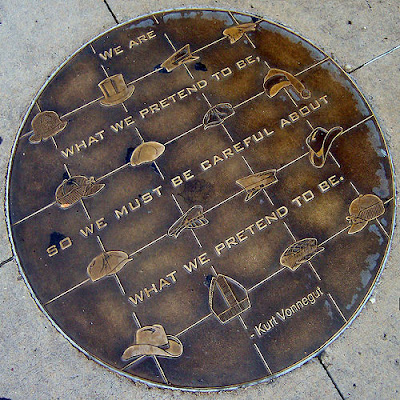
Regular blogging will continue tomorrow.
Blog: librarian.net (Login to Add to MyJacketFlap)
JacketFlap tags: obit, lj, vonnegut, libraryjournal, books, Add a tag
This interview with Kurt Vonnegut appeared in Library Journal almost 34 years ago, it was nice of LJ to put it on their website.
Vonnegut expressed no surprise, however, at the censorship problems some of his books have run into with public schools in parts of Michigan and Ohio. “It’s the same thing every time. They ban something of mine, the ACLU jumps in, loses the case in the lower court, and wins the appeal. After all,” he stresses optimistically, “they can’t win. What they’re doing is unconstitutional.”libraryjournal, lj, obit, vonnegut
Blog: librarian.net (Login to Add to MyJacketFlap)
JacketFlap tags: books, obit, lj, vonnegut, libraryjournal, Add a tag
This interview with Kurt Vonnegut appeared in Library Journal almost 34 years ago, it was nice of LJ to put it on their website.
Vonnegut expressed no surprise, however, at the censorship problems some of his books have run into with public schools in parts of Michigan and Ohio. “It’s the same thing every time. They ban something of mine, the ACLU jumps in, loses the case in the lower court, and wins the appeal. After all,” he stresses optimistically, “they can’t win. What they’re doing is unconstitutional.”libraryjournal, lj, obit, vonnegut
Blog: The Califa Police Gazette (Login to Add to MyJacketFlap)
JacketFlap tags: Vonnegut, Add a tag
"I work at home, and if I wanted to, I could have a computer right by my bed, and I'd never have to leave it. But I use a typewriter, and afterwards I mark up the pages with a pencil. Then I call up this woman named Carol out in Woodstock and say, 'Are you still doing typing?' Sure she is, and her husband is trying to track bluebirds out there and not having much luck, and so we chitchat back and forth, and I say, 'OK, I'll send you the pages.'
"Then I'm going down the steps, and my wife calls up, 'Where are you going?' I say, 'Well, I'm going to go buy an envelope.' And she says, 'You're not a poor man. Why don't you buy a thousand envelopes? They'll deliver them, and you can put them in a closet.' And I say, 'Hush.' So I go down the steps here, and I go out to this newsstand across the street where they sell magazines and lottery tickets and stationery. I have to get in line because there are people buying candy and all that sort of thing, and I talk to them. The woman behind the counter has a jewel between her eyes, and when it's my turn, I ask her if there have been any big winners lately. I get my envelope and seal it up and go to the postal convenience center down the block at the corner of 47th Street and 2nd Avenue, where I'm secretly in love with the woman behind the counter. I keep absolutely poker-faced; I never let her know how I feel about her. One time I had my pocket picked in there and got to meet a cop and tell him about it. Anyway, I address the envelope to Carol in Woodstock. I stamp the envelope and mail it in a mailbox in front of the post office, and I go home. And I've had a hell of a good time. And I tell you, we are here on Earth to fart around, and don't let anybody tell you any different."-- Kurt Vonnegut
Blog: The Excelsior File (Login to Add to MyJacketFlap)
JacketFlap tags: vonnegut, Add a tag

It occurred to me at some point in the last year that I should be thinking about writing a personal obituary for Kurt Vonnegut. It wasn't that I thought his passing was inevitable, I merely wanted to be prepared because I knew the moment I heard the news I probably wouldn't be able to articulate my ideas and feelings. I kept putting it off, occasionally convincing myself that it was ghoulish to believe the man didn't have more years in him, that I still had plenty of time.
Looks like I missed the deadline.
It started in my garage. In my early teens the garage became one of those in-house sanctuaries for exploration and time alone. It was there that I discovered boxes of private things my dad owned. This didn't initially strike me as odd as my parents clearly held different personal and political views and to prevent discord they defaulted to abstinence. Politics were not discussed because they supported different parties. We owned more music than books but because they had different tastes (mom dug Motown, dad was a country-folkie) it was never played. Apparently there were books belonging to my dad that didn't belong with what few books we owned in the one bookcase in the living room.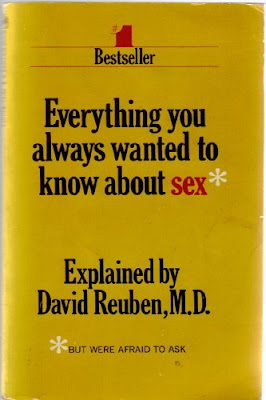 It wasn't personal taste that caused the segregation of those books, but the dangerousness of their subject matter -- Everything You Always Wanted To Know About Sex (But Were Afraid To Ask) by Dr. David Reuben and Welcome To the Monkey House by Kurt Vonnegut, Jr. It might have seemed rational with my hormones raging that I would have gravitated to the book about sex but a quick glance at its contents scared me. The book made repeated references to the sexual practices and activities of men and women, and to my teenage mind that meant adults, which included my parents, and I didn't want any unsavory mental pictures. That left me the Vonnegut to puzzle out, which I did over the course of a month's worth of bathroom visits. The bathroom was my other sanctuary and allowed me to read the book in secret. My parents probably thought I was masturbating.
It wasn't personal taste that caused the segregation of those books, but the dangerousness of their subject matter -- Everything You Always Wanted To Know About Sex (But Were Afraid To Ask) by Dr. David Reuben and Welcome To the Monkey House by Kurt Vonnegut, Jr. It might have seemed rational with my hormones raging that I would have gravitated to the book about sex but a quick glance at its contents scared me. The book made repeated references to the sexual practices and activities of men and women, and to my teenage mind that meant adults, which included my parents, and I didn't want any unsavory mental pictures. That left me the Vonnegut to puzzle out, which I did over the course of a month's worth of bathroom visits. The bathroom was my other sanctuary and allowed me to read the book in secret. My parents probably thought I was masturbating.
The advantage of a short story collection is that you get a sampling of an author's voice and talents. While there were stories that I appreciated -- "Harrison Bergeron", "D.P." and "Tomorrow and Tomorrow and Tomorrow" -- I wasn't quite satisfied. I felt like there was something more, something I wasn't really getting. It was time to go to the library.
This Vonnegut person had a good smattering of books on the shelves, the most promising of which was Cat's Cradle. I pulled it down and found a nook at the edge of the adult reading room and began reading. The chapters were short, like an early chapter book, but the story was told in an almost glib voice, staccato phrasing and disjointed. I didn't get it, mostly because I was unfamiliar with the style. I put the book back and gave up on Vonnegut.
A month later in a casual conversation with a classmate named Po I found another person who'd heard of Vonnegut. No, she hadn't just heard of him, she was practically an apostle. Her older brother had hipped her to his books and she was fan enough to recount all their plots in great detail. What she told me not only rekindled my interest but was exactly the confirmation I needed to know going in: "He's a cynical bastard, Elz, you'll like him." I think that's what she said. She might have actually said "you're like him."
As luck would have it in these situations Vonnegut had a new book out called Breakfast of Champions. I had no idea what I was in for but I was determined to figure out what this Vonnegut person was all about. There were raised eyes from the ladies at the check-out counter of my library but nothing more. I had planned to wait until I got home to start reading but curiosity got the better of me. And there I was, standing in the middle of the sidewalk reading the words and looking at the pictures (pictures! juvenile scrawl in the author's own hand!) thinking: I can't believe they would publish this.
In his own way, Vonnegut casually begins his book on matters that seem tangential to the story, or offered up as background. What he's actually doing is setting up his leitmotifs and his riffs, a verbal overture if you will meant to fool you into thinking that the story's coming, soon, sooner, just wait. In Breakfast of Champions there is talk of stories being published in nudie magazines, wedged between beaver shots, and for those who might be confused he offers his own drawings of what those photos would look like followed by a drawing of the animal it is compared with. I might not have been ready to deal with the realities of sex, but this I could understand!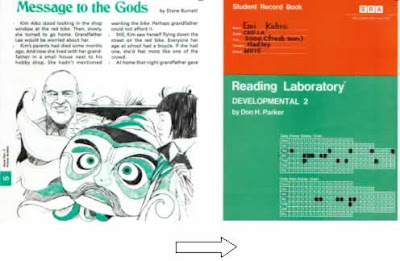 And then a funny thing happened: I started liking books again, started liking reading. Over the course of seven years of formal education I had slowly had the joy of reading drained and beaten out of me. The initial flush of excitement that comes from being able to read for yourself had slowly been choked by endless worksheets full of directions, SRA booklets and Ginn & Co. readers with serviceable, workman-like stories designed for comprehension questions. The encouragement to read was still there, the library talks and the individual recommendations from teachers, but the joy had been deadened. By seventh grade the materials we were being introduced to had importance and carried weight as classics (or at the very least culturally significant) but there was little fun to be extracted from the exercise of reading, much less from the subject matter.
And then a funny thing happened: I started liking books again, started liking reading. Over the course of seven years of formal education I had slowly had the joy of reading drained and beaten out of me. The initial flush of excitement that comes from being able to read for yourself had slowly been choked by endless worksheets full of directions, SRA booklets and Ginn & Co. readers with serviceable, workman-like stories designed for comprehension questions. The encouragement to read was still there, the library talks and the individual recommendations from teachers, but the joy had been deadened. By seventh grade the materials we were being introduced to had importance and carried weight as classics (or at the very least culturally significant) but there was little fun to be extracted from the exercise of reading, much less from the subject matter.
Vonnegut gave me hope. There were adults in the world writing books that were as outrageous as the British comedy that was being exported to PBS, full of the absurdities of mankind told with a dry acerbic wit. I got it, enough to send me back to Cat's Cradle and Slaughterhouse-Five. It sent me to the drama section for a script of a PBS television adaptation of his stories called Between Time and Timbuktu. I reread the short stories with a new eye. By the time I was in eighth grade and had to write a book report/personal narrative in long-form (over 12 pages) I not only wrote in my version of Vonnegut's style, I made him a character in the report. I used to say Vonnegut taught me how to write but that's not true; Vonnegut gave me permission to borrow his voice until I could find my own, and he gave me a few hints about where to find it as well.
Vonnegut's name attached to a review in either Newsweek or Time made mention of Joseph Heller and Philip Roth. I read Catch-22 and Portnoy's Complaint as a result. Comparisons to Twain were made, but as much as I appreciate Twain's wit I never cared for the style. Understanding this didn't make it easier for me to find the kinds of voices I was looking for in literature but it did lead me down some unusual paths. I was too impatient to actually learn the finer points of craft in my own writing -- I would race to tell a story but skimp on details, butchered spelling, sucked at editing for clarity -- but I didn't let piddling details stop me. Another friend once referred to some poetry I attempted as Ginsburg-esque, an insult at the time because I wanted to be forward-looking, not beatnik. When it came time to head off to college I brought along two treasured authors: Vonnegut and Charles Bukowski.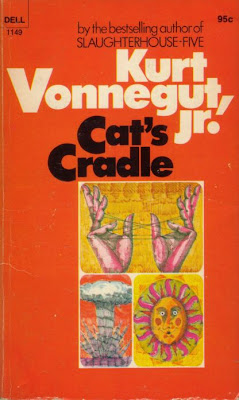 Perfect for art school.
Perfect for art school.
I suppose the death watch on Vonnegut officially begins in the mid-1980's. In the same year he published his last great book (in my opinion) Galapagos and attempted suicide. There was, in the back of my mind, a hope that one day I might be able to meet the man, that I would be in a place where we would both have something to talk about to each other. More than fanboy idolatry and perhaps something close to peer. Or master and student. But if my onset of puberty happened on-time my creative maturity has taken somewhat longer and the thought of ever being even a fledgling desciple long past. A
t a certain point when my beloved creatives began to shuffle off this mortal coil I realized my time with each of them was precious and limited. In the ever-present question of whom I would invite to a fantasy dinner for conversation the list of possible names on the roster keeps getting shorter. Up until yesterday Vonnegut's name was at the head of the table. Robert Altman was at that table until last year. Something tells me J.D. Salinger is going to bow out before I can send the invitation.
In the end I figured Vonnegut would play the wise old cuss until the very end. For all his doom and gloom he held in his heart a place for the redemption of humanity, no matter how much he argued for the other side. That is until recently. The election and re-election of George Bush and the policies and actions of the Bush administration finally broke his resolve. Here is a man who, as a US Infantryman, survived the fire bombing of Dresden in World War II and witnessed all of human history for the second half of the 20th century and could still find glimmers of hope that we weren't headed for self-destruction as a species. But for the last six years he has had that hope whittled away until finally, in his essays for In These Times (later collected in Man Without a Country) he had concluded there was no longer any reason to hold out hope.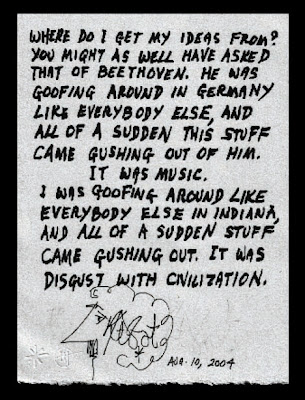 In short, George W. Bush killed Kurt Vonnegut.
In short, George W. Bush killed Kurt Vonnegut.
Vonnegut had anticipated dying from his addiction to cigarettes. He considered it an elegant form of suicide. Even twenty years after his official suicide attempt he was still going strong, still smoking, still unable to kill himself. Much like his faith in humans to not blow themselves into smithereens, that optimism that informed his cynicism kept him alive. Like many of us, we want to know how the movie is really going to turn out. The minute he began to feel all was lost was when he began to give up. I know he died from brain injuries suffered after a fall in his home, but somewhere in that brain the switch to fight for survival had been flipped to the off position.
In time, as with all writers, all that remains is the voice. For those who have left us many years ago the sting of that loss is dulled, if present at all. Those born today will not miss Vonnegut the person for lack of the intangible sense of having walked the Earth at the same time he did. Somehow, being alive at the time of a writer gives their voice a certain meaning, a sense of something shared. In the end the voice still carries on, in books, in recordings, in memories of speeches given. The voice is time-stamped, dated. He has said all he will ever say.
“If I should ever die, God forbid, let this be my epitaph: The only proof he needed for the existence of God was music." —Kurt Vonnegut, A Man Without a CountyGood-bye, Blue Monday.



My husband and I were just talking about the karass the other day. (We couldn't remember the name of it, though, so we called it "The thingy that Vonnegut wrote about.")
Somehow, "so many people in the same device" made me think of literary device. Perhaps those people are tangled up because they're in some *$#@#!ing author's novel. Have you seen Stranger Than Fiction? Love the way you do your research and give us the extended story.
And what is a literary device if not the hand of divine fate (the Author Almighty) guiding those characters toward their destinies?Have not seen Stranger Than Fiction yet. It's full of everything I like, except it's about writers. I always find movies about authors leave me wanting to cleanse my palate with documentaries, for some strange reason.
Nice, nice very nice indeed. Thanks for all the wonderful trivia.